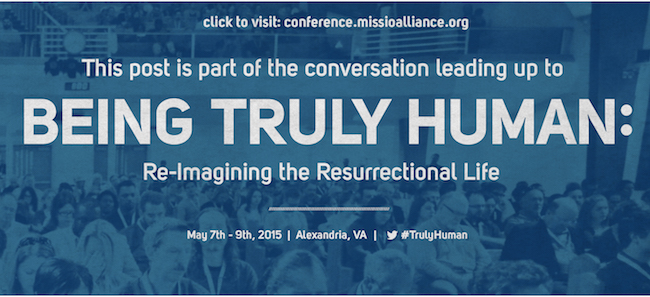Protests and Sacraments
This spring, Missio Alliance will be hosting a national gathering around the theme of Being Truly Human: Re-Imagining the Resurrectional Life. Leading up to the conference the Missio blog space will help segue into that gathering.
Missio Writing Team member Ty Grigg and I (Ruthie) decided to join forces for this series as we navigate the events in our nation, humanity and how to interact with others around those issues. Our big idea is examining
Public Demonstrations as Embodied Sacred Spaces for Identity Transformation
We want to lead up to this through some smaller conversations about sacrament, space, embodiment and identity. Ty is kicking us off:
I belong to this group in the suburbs of Chicago that regularly gets together for public demonstrations. These demonstrations make us and the world aware of invisible realities – realities that most people are ignorant of, indifferent about, or outright deny to be true. Others are supportive about what we are proclaiming but still stay at home. They are under the impression that agreement is just as good as action. Some people participate regularly but do not put much stock in the demonstration itself. To them it seems more theatric than productive. What they miss is that the theatric is productive.
The story that we tell makes claims about power and love, truth and justice that necessarily confront all other stories. It forces us to make a decision about where our allegiance lies…every. single. time. It exposes our hidden hate, anger, apathy, and disunity. It is not always apparent what we are accomplishing except that it guards us from complacency and keeps us vigilant in the struggle. We remember where we have come from and where we are going. In our collective action we have found solidarity in our grief and strength to be a light in dark places. I cannot fully explain it, but through these regular public demonstrations my loyalties and commitments have shifted. The way I see myself, others and the world is different. We are recovering what is most true about humanity and about God.
These groups have also been gathering in Ferguson, New York City, Washington and all over the world. There have been public demonstrations such as this happening for thousands of years. This group is the church and we call this particular public demonstration communion or Eucharist.
The Eucharist meal is a sacrament – a visible thing that points to an invisible reality that makes that reality present and effective. Sacraments are found all throughout Scripture where rituals and sacred times and sacred places are given to God’s people – where Creation is the material means by which God encounters with people. The Incarnation of Christ is the most notable example of God taking up flesh and blood to be with humans. Jesus is the ultimate Sacrament. Humans are sacramental beings. God engages us through God’s Creation – water, wine, bread, and bodies. We should be the last people to be skeptical of the transformation that can occur when bodies gather in space and time.
So when Christian brother told me several weeks ago that he thought that the marches happening across the country were unproductive for racial reconciliation and that the demonstrations were baiting the police into violence, it reminded me of our “unproductive” Eucharist demonstrations. In what ways might non-violent protests be sacramental? They bear public and visible witness to the hidden reality of racism. They tell a story that calls for a response. They expose our allegiances and biases. Participating in a demonstration actualizes solidarity with those who are being oppressed. As we physically gather we get a taste of the world in which we long to live in the present. Sounds a lot like a sacrament.
While what happens online is significant, the requirements for love and justice cannot be fulfilled from the warm glow of our computer screens. We are humans after all. Sacramental actions bridge us from the world we live in to the world that God is preparing for us. In this space, standing shoulder to shoulder with others, carrying signs and marching down streets, laying down on the ground in silence and chanting truths like “black lives matter” are sacramental acts that expose the disguised injustices and propped-up powers and call for a commitment to an alternate reality.
As we move towards conversation on what it means to be Truly Human,we want to talk more about the space we share together. How do we recognize what God is doing in us? How do we recognize what God is doing in others? Next month we’ll talk about the importance of shared space in identifying in one another and the imago Dei.
For now, we want to leave you with this:
How has sacrament influenced your view of yourself and others?
—
[Image by jamie nyc, CC via Flickr]



